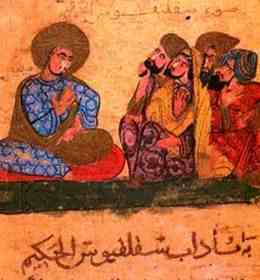Prominent Saudi and Greek institutions have teamed up to organize a major international cultural symposium that will shed new light on the historical ties between the Arabian Peninsula and the Greek world on one hand and on the cultural interaction between the two regions from antiquity to the 10th century AD on the other.
 The high-profile event will be formally opened by Prince Turki Al-Faisal, chairman of the King Faisal Center for Research and Islamic Studies, in Riyadh on Monday.
The high-profile event will be formally opened by Prince Turki Al-Faisal, chairman of the King Faisal Center for Research and Islamic Studies, in Riyadh on Monday.
Addressing a press conference at King Abdulaziz Historical City on Saturday, Abdullah A. Al-Abduljabbar, chairman of the symposium’s organizing committee, said that Greek Minister of Culture Pavlos Geroulanos would attend the event besides a number of scholars and archaeologists from 17 different countries. Journalists were also briefed by Greek Ambassador Dimitrios Letsios and Ali Al-Ghabban, vice president of the Saudi Commission for Tourism and Antiquities (SCTA).
Al-Abduljabbar said about 64 historians and archaeologists will participate in the event that focuses on Greek and Byzantine influences, classical writers’ perspectives of the Arabian trade, maritime connections and the importance of Greek inscriptions and Arab sources. The event will be attended by a panel of 15 scholars from Greece alone.
Ambassador Letsios, while referring to the strong ties between the two regions since antiquity, said the time span (5th c. BC-10th c. AD) covers the first references of Greek travelers and historians to “Arabia Felix,” the birth of trade routes, including the incense route, and the proximity that the two worlds acquired with the conquests of Alexander the Great.
“This period also covers the perplexed network of politics with the birth of Byzantium and the expansion of Islam, as well as the cultural impact that this contact had on all these civilizations,” said Letsios. Most scholars and historians participating in the event are from the UK, Egypt, Germany, France, Yemen, Tunisia, Algeria, Russia, China, the UAE, Belgium, Sweden, Poland, South Africa and Turkey, said Al-Ghabban.
Saleh Mohammed Al-Ghamdi, Saudi ambassador to Greece, will also attend the symposium besides several Saudi officials, historians and scholars. Al-Ghabban pointed out that the King Faisal Center for Research and Islamic Studies and SCTA are organizing the event in cooperation with other Saudi and Greek institutions including the Greek embassy, King Saud University and the Athens-based Institute for Graeco-Oriental and African Studies.
Author: Ghazanfar Ali Khan | Source: Arab News [December 05, 2010]





